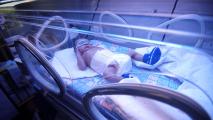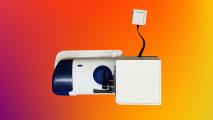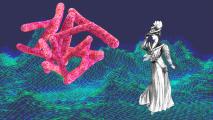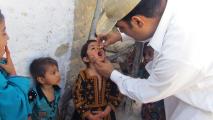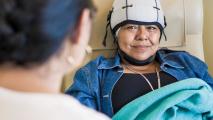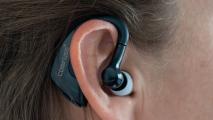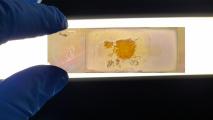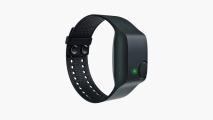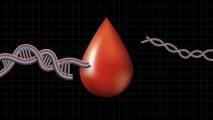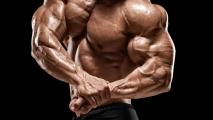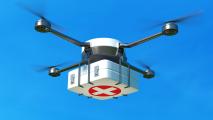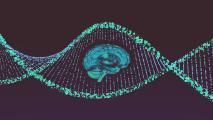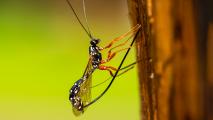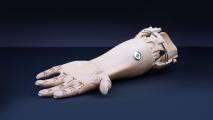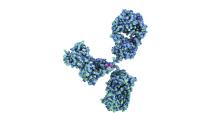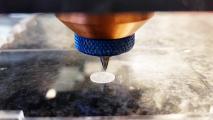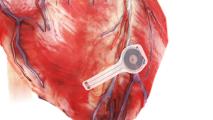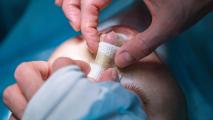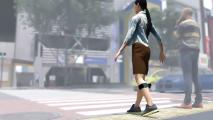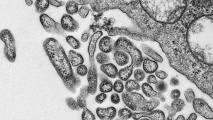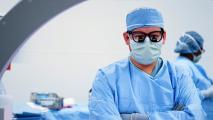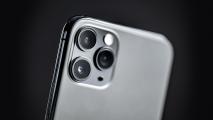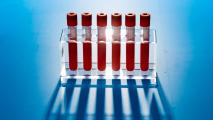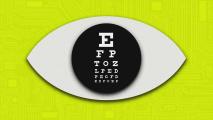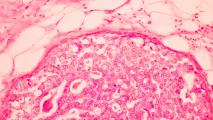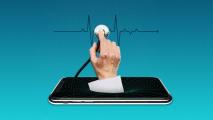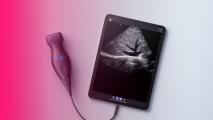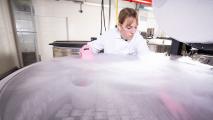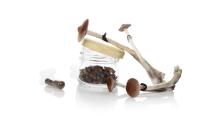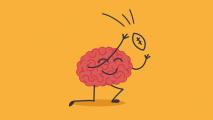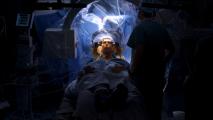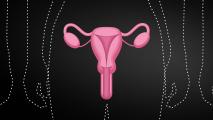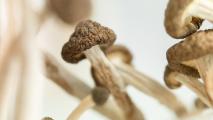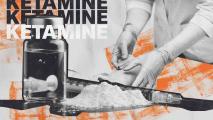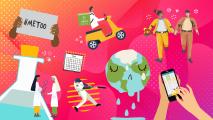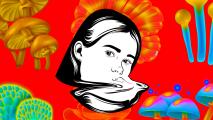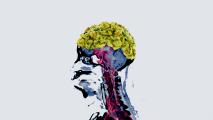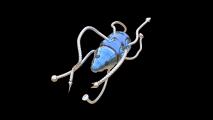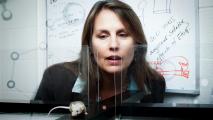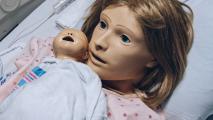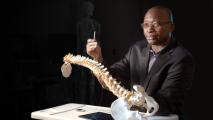Field: Healthcare
First person cured of type 1 diabetes thanks to stem cells
An experimental stem cell treatment has eliminated type 1 diabetes in a patient, giving experts guarded hope for a diabetes cure.
A simple webcam can automatically catch — and treat — infant jaundice
Researchers in Australia and Iraq have developed a system that uses a webcam to catch infant jaundice and begin treatment right away.
This device can automatically detect and reverse opioid overdoses
Researchers at the University of Washington have developed an AI-powered wearable to detect, and reverse via naloxone injection, opioid overdoses.
A patch to treat peanut allergies appears safe to wear for years
A peanut allergy can be debilitating at best, and life threatening at worst. A new possible treatment looks to be safe to wear for at least three years.
7 scientists we are thankful for this Thanksgiving
One of these scientists saved more lives than any other person in history.
Tuberculosis may spread through aerosols, without coughing
University of Cape Town researchers believe tuberculosis may spread in small aerosols, much like COVID-19.
Just $50 can turn your phone into a powerful chemical, pathogen detector
If this becomes a common feature of smartphones, it could someday allow anyone to identify pathogens and detect impurities in food.
A new clue in why oral vaccines don’t work as well in developing countries
Oral vaccines are crucial to public health, but work worse where they are needed most. A new mouse study has a potential reason why.
A brain implant lets a blind person see again — without using their eyes
A former science teacher who had been blind for 16 years received a brain implant that allowed her to see shapes again.
First-ever: drone delivers lungs for transplant
An uncrewed drone has carried a pair of lungs from Toronto Western Hospital to Toronto General Hospital. It was the first time lungs were transported by drone anywhere in the world.
Cooling caps can help prevent chemo hair loss
Chemo hair loss is a common side effect for cancer patients, but cooling caps can help limit the loss.
Ear sensor can monitor COVID-19 patients remotely
An ear sensor successfully alerted doctors to signs that COVID-19 patients isolating at home were getting worse and should be hospitalized.
Smart microscope slides make breast cancer cells leap off screen
Breast cancer cells appear brightly colored when placed on new smart microscope slides, which could help doctors diagnose patients earlier.
Wearable health monitors help predict flu before symptoms start
A human challenge trial suggests that wearable health monitors could help predict flu and cold infections before symptoms appear.
New portable blood test kit is cheap, fast, and accurate
A new blood test kit that’s fast, portable, and accurate could help bring better healthcare to people in remote and underdeveloped areas.
A blood test for your circadian clock
Your circadian clock controls more than when you sleep and wake. Researchers are developing a simple blood test to try and accurately tell your time.
Cambridge researchers have created a mathematical model for building muscle
Now there’s a mathematical model that could maximize the effectiveness of exercise.
Drone ambulances race to help cardiac arrest victims (Updated)
Drone ambulances deliver defibrillators to suspected cardiac arrest victims more quickly than traditional ambulances in a Swedish study.
Brain-wide gene editing may one day treat Alzheimer’s
Researchers have developed a brain-wide gene editing technique that treated Alzheimer’s disease in mice.
Scientists grew healthy mice from artificial eggs cells and ovaries
For the first time, researchers have created mice from egg cells and ovaries grown from stem cells.
Wasps inspire a new surgical needle
The next new surgical tool may come from an odd place: parasitic wasps whose eggs eat their hosts inside-out.
Using body bags to treat heatstroke
The Pacific Northwest heat wave crushed hospitals with heatstroke victims. Doctors turned to body bags to save lives.
Series|
Challengers
26-year-old builds $8,000 mind-controlled bionic arms
Bionic arms used to cost $80,000. Now, a young engineer has lowered the cost by over 90%.
Inside your nose, it’s bacteria vs. bacteria in the fight against meningitis
Researchers have found that nose drops containing “friendly” bacteria can protect people against meningitis-causing bacteria.
New antibodies may lead to a norovirus vaccine
Researchers have discovered antibodies that neutralize a variety of norovirus strains, a possible step toward an effective norovirus vaccine.
Harvard has a vaccine against septic shock
A new vaccine platform based on biomaterial may eventually provide rapid protection against multiple bacterial threats.
This 3D-printed graft may improve ruptured eardrum surgery
Researchers at Harvard have developed a 3D-printed graft they hope will make ruptured eardrum surgeries safer, faster, and more effective.
This wireless pacemaker dissolves into your body
Researchers at Northwestern and George Washington University have developed a pacemaker that dissolves into the body.
These glowing bacteria can diagnose gut problems
Using synthetic biology, a team at Rice has designed bacteria that can sense signs of inflammatory bowel disease in mice.
3D-printed nose cartilage may someday fix your face
Researchers have developed a way to bioprint nose cartilage that they hope will one day minimize the need for invasive harvesting from the ribs.
Color-changing gold tattoo can monitor your health
Researchers have found a way to use gold nanoparticles to help diagnose medical problems by embedding them in an invisible tattoo.
An IBM quantum computer is being built at a US hospital
An IBM quantum computer is being installed at the Cleveland Clinic as part of the organizations' Discovery Accelerator collaboration.
Nurse’s smelling “superpower” leads to skin swab test for Parkinson’s
Researchers developed a skin swab test for Parkinson’s after studying a woman’s strange ability to smell the disease.
Doctors can now see the lungs of a newborn breathing
There’s a lot about newborn breathing doctors don’t know, but a new imaging technique that can record a baby’s first breaths is pulling back the curtain.
“Heart in a box” gives 6 kids second chance at life
For the first time, TransMedics’ “heart in a box” machine has been used to help children in need of heart transplants, with great success.
Radioactive bone cement may help treat spinal tumors
External radiation can damage bones and cause side effects. Radioactive bone cement directly into the spine may be a better option.
Stamp-sized wearable health monitor can do it all
Researchers at UCSD have developed a wearable health monitor that can measure both cardiovascular and biochemical signals at once.
Total artificial heart approved for sale in Europe
The European Commission has approved the sale of Carmat’s total artificial heart, which is designed for patients with end-stage heart failure.
Nerve-stimulator helps people walk after MS and strokes
The EvoWalk wearable uses electrical stimulation, sensors, and AI to combat foot drop, a condition commonly linked to MS and strokes.
Smart vaccine device could speed up development process
An in-development smart vaccine device uses a microneedle patch to both deliver a vaccine and measure the immune response it generates.
Cancer blood test trial to launch in the UK
The UK is trialing a blood test designed to detect 50 types of cancer at once, which could be a gamechanger in cancer screening if proven effective.
Green space at daycare gives city kids an immune boost
Adding a green space to an urban daycare’s playground can boost a child immune system after just 28 days.
A microevolution is happening in humans right now
More humans are being born with a third arm artery, an example of microevolution happening right before our eyes.
A deadly virus emerged in South Africa in 2008. Then it vanished.
A deadly new virus killed a South African safari agent and three others, then disappeared without a trace. What can we learn from a unique outbreak?
Jaw joints grown from fat could alleviate TMJ pain
Researchers have grown new jaw joints for pigs from fat-sourced stem cells, and the technique could one day cure TMJ pain, or even knee pain, in people.
Smart vibrator helps scientists study female orgasms
The Lioness Sex Research Platform is helping scientists study female orgasms by providing anonymized data collected by a smart vibrator.
Doctors fighting deadly climate change
In partnership with Skoll Foundation
These doctors are coming together to address their collective carbon footprint, explore new solutions, and improve sustainability in healthcare.
MIT can now monitor your sleeping position with radio waves
A new sleep monitor out of MIT uses reflections from radio signals — not cameras or body sensors — to track a person’s sleeping positions.
FDA approves first artificial pancreas for young children
The FDA has approved a new artificial pancreas for children, making diabetes management easier for caretakers of diabetics as young as two.
Redesigned syringe could increase global access to medicine
A double-barrel syringe developed at MIT makes it possible to inject highly viscous biologics, making them more accessible to patients.
A health app could someday detect heart disease via selfies
Researchers in Beijing created a new deep learning algorithm, which claims to detect signs of heart disease in the human face.
Study may explain why cancer gets more aggressive as we age
A molecule in the blood of older people promotes the spread of cancer, which could explain the link between age and metastatic cancer.
Using smartphone cameras to detect diabetes
A new algorithm can detect diabetes using data collected by a smartphone’s camera, offering a way to address the problem of undiagnosed diabetes.
The material that could help humans become cyborgs
Coating implantable electronics in the polymer PEDOT can extend their life, which could make cyborgs more common in the future.
Can a wellness app really change someone’s life?
In partnership with Virgin Pulse
America has the highest per capita health spending in the world, and yet, worse population health outcomes than most other developed nations. This wellness app gets to the heart of the issue.
A new way to promote bone healing, inspired by LEGO blocks
Drawing inspiration from LEGO blocks, researchers have created a new type of scaffold to facilitate better bone healing and soft tissue repair.
New blood test for cancer could lead to earlier diagnoses
A new blood test for cancer that can detect the disease four years before symptoms appear could one day be used as a routine cancer screening tool.
End-of-life AI
End-of-life and palliative care discussions with patients are crucial but difficult. Can AI help?
Personalized blood test for cancer hunts down tumor DNA
A newly unveiled personalized blood test for cancer monitoring has a sensitivity 10 times that of existing liquid biopsy methods.
Series|
Catalysts
Online eye exams will change the way we buy glasses
In partnership with Stand Together
The FDA recently lifted restrictions against an online eye exam provider to help optometrists reach their patients during the pandemic. Will vision care go virtual for good?
Genetic “off switch” may lead to new breast cancer treatment
A much-needed triple negative breast cancer treatment could center on the suppression of a single gene identified in a new Tulane University study.
Hospitals, morgues, and drive-ins: Empty stadiums fill new purposes
Their roars dulled, empty stadiums are serving as field hospitals, supply depots, morgues, drive-in theaters … and an Airbnb.
Telemedicine is the new normal. But can it survive after COVID?
As medical professionals struggle to meet the needs of patients during the coronavirus pandemic, telemedicine companies have become welcome allies that could drastically alter the future of healthcare.
New health wearable measures sweat to track your mood
An app that works with a wearable wrist sensor to track how much a person sweats could change how we harness the power of biodata in the future.
This ultrasound connects to an iPhone to help catch COVID-19
Ultrasound can be a useful diagnostic tool for COVID-19. A portable ultrasound machine called the Butterfly iQ may make it safer.
Researchers are rushing to freeze… lab mice sperm?
With their labs closing and the future unclear, researchers are sending precious cargo — the sperm of lab mice — to be frozen and stored.
Can green light therapy cure chronic pain?
Scientists are finding that exposure to the color green, also known as green light therapy, could provide natural chronic pain relief.
Cancer survivor gives birth thanks to a new fertility procedure
A French cancer survivor is the first person to give birth via a fertility treatment that involves freezing and thawing eggs that underwent in vitro maturation.
Psychedelic mushrooms explained
Psychedelic mushrooms, AKA magic mushrooms or psilocybin mushrooms, are currently being researched as a treatment for depression, addiction, and more.
Does playing sports quiet the brain?
Athletes across many sports have something in common - they can more easily “quiet” their brain to focus on what’s really going on.
Deep brain stimulation for Parkinson’s, Tourette’s
Deep brain stimulation surgeries have the power to relieve the symptoms of Parkinson’s, Tourette’s, and other involuntary movement disorders.
The first universal flu vaccine could be coming soon
After flu season, vaccines are outdated and researchers must predict next year’s virus. But soon, we may have a universal flu vaccine that doesn't expire.
Understanding health insurance doesn’t have to be a burden
In partnership with Collective Health
A recent study found that the vast majority of Americans can't accurately explain terms like "deductible" and "copay." And more than half of all bankruptcies are linked to medical expenses. This Silicon Valley startup’s model could be just what we need to turn the tide.
Unlocking the mysteries of muscles in motion
New kirigami-inspired skin patch may help people avoid injury, as it expands our understanding of muscle activity.
Series|
Catalysts
Rethinking addiction recovery with fitness
In partnership with Stand Together
As drug overdose deaths climb higher, this gym is challenging the thinking behind traditional models for addiction recovery services with free memberships open to anyone sober for at least 48 hours.
Series|
Future of Fertility
Uterus transplants: A step closer to overcoming infertility
About 1 in 500 women have a condition that prevents pregnancy called absolute uterine factor infertility, but recent developments show promise that a uterus transplant surgery could be the solution.
Series|
Dope Science
Microdosing psychedelics
Microdosing is the no-flowers-in-your-hair practice of regularly taking minimal amounts of hallucinogenic substances. Although it’s currently illegal, millions of dollars are being poured into further research.
Ketamine explained: Understanding the special k drug
Ketamine, known recreationally as the “Special K” drug, is a trance-inducing anesthetic that researchers believe has more powerful uses off the dance floor.
9 ways the 2010s decade changed the world
From Tinder to CRISPR, these are the top moments, movements, and ideas through which the 2010s decade shaped the world as we know it.
Healing PTSD with MDMA therapy
New hope for PTSD sufferers is coming from an expected quarter: MDMA.
We may have found a drug to curb meth addiction
Meth addiction is on the rise, so this team of researchers is working to develop the first FDA-approved medication to treat the use disorder.
New promise for psychedelics and depression
New findings on psychedelics and depression show the benefits of microdosing, and could present more effective treatment options.
Series|
Dope Science
Cannabis as a natural treatment for autism
When typical medications simply aren’t doing enough to manage their children’s symptoms, mothers like Jenni Mai are turning to medical marijuana. But with current regulations, parents are having to become pharmacists for their own families, and some are even moving across the country so they can legally access cannabis.
Marijuana and autism: Removing the stigma
Research is beginning to prove the hopeful connection between marijuana and autism treatment for symptom relief. Here is one man’s inspiring story.
Shedding the stigma of substance use
In partnership with Stand Together
By achieving fitness goals together, The Phoenix community is peeling off the shame, regret, and stigma often associated with addiction.
What's special about cancer-killing nanobots? precision.
These tiny, robotic machines can deliver drugs directly to infected cells, and they're changing the future of medicine.
Breaking the taboo of male infertility
Male infertility contributes to up to half of infertility cases. Why is it so hard to talk about?
Why don’t women’s health companies get adequate funding?
Celmatix Founder and CEO Piraye Beim gives an inside look into the battle to secure funding for women's health.
For childhood cancer survivors, adult fertility isn’t a given
Experimental procedures offer beta solutions for girls, and more time to figure it out for boys.
A molecular biologist discusses the morality of gene editing
Molecular biologist Daisy Robinton speaks out on our moral imperative to solve some of humanity's greatest health threats.
Series|
Future of Fertility
IVG: making babies from skin cells
The designer babies of the future are closer than we think. With a new process called IVG, a person could essentially choose their baby’s traits, and same-sex couples could make a biological family.
This electronic musician is transforming the soundscape of hospitals
Trained as a classical pianist, ambient artist Yoko Sen is on a mission to redesign medical devices' beeps and buzzes and save us from alarm fatigue.
Addict-turned-neuroscientist on addiction and the brain
In our interview with neuroscientist Judith Grisel, she discusses the state of research on addiction and the brain, as well as society’s view of addicts.
Scientists are using AI to improve breast cancer screening
Computer scientists at MIT created a new algorithm for breast cancer screening to predict whether a patient will develop the disease in the next 5 years.
Robotic birth simulator saves lives in the delivery room
Meet the group of medical professionals that’s delivering babies from robots to prepare for real-life emergencies in the hospital room.
Take a trip to Johns Hopkins' new psychedelic research center
Johns Hopkins is throwing its considerable clout behind the fast-growing field of psychedelic research, pouring $17 million into a research center to study the hallucinogenic drugs.
Bringing community healthcare to the people
In partnership with Skoll Foundation
There is an urgent challenge in Sub-Saharan Africa: people are dying from treatable illnesses like malaria, pneumonia, and diarrhea. Now, people are turning to their neighbors for community health care.
Hope grows for patients with spinal cord injuries
Severe spinal cord injuries resulting in total paralysis are usually considered permanent, with no hope of recovery. And yet, in a handful of patients spanning multiple levels of severity, movement is being regained.
Series|
Superhuman
Spinal implants: Helping the paralyzed walk again
Walking after complete spinal cord injury used to be a far-fetched dream. But, with advances in spinal cord implants for paralysis, even paraplegics have been able to regain mobility and walk again.
Ever wonder what happens to leftover crayons?
This dad is melting down old crayons for kids who need them most.

